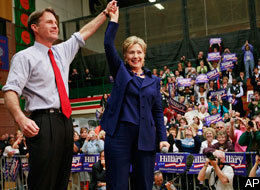 Hillary Clinton must know that there are at least three ways she might have been president.
Hillary Clinton must know that there are at least three ways she might have been president.
Had she been modest enough to return home to build a Senate candidacy, rather than relocate to New York, she would have been handed the 2004 Illinois seat; and the young legislator named Obama who actually won that year might have become, say, a precocious lieutenant governor aiming higher, and the Democratic nomination would have been hers for the asking four years later.
On the flip side, had she been more immodest, she would have sought the presidency earlier, in 2004, a year when the Democratic field was weak and George W. Bush was vulnerable. Had she been a shade luckier, in 2008, Florida and Michigan would have saved their primaries for Super Tuesday, and the comfortable wins they gave her would have been decisive instead of being discounted under the byzantine nominating rules of that cycle.
 It’s enough narrowly missed fortune to haunt even a happy, contented soul who has power and fame to spare. Whether or not she feels cheated by destiny, though, Clinton can’t help but hear the drumbeat: the one from female activists who regret their coolness toward her in the last race; the one from Democratic insiders who don’t like the shape of a 2016 field of national novices; and the one from a surprising combination of the grassroots and the elite who aren’t bound to either party but harbor this quaint notion that for once, the most supremely qualified individual ought to advance to the presidency.
It’s enough narrowly missed fortune to haunt even a happy, contented soul who has power and fame to spare. Whether or not she feels cheated by destiny, though, Clinton can’t help but hear the drumbeat: the one from female activists who regret their coolness toward her in the last race; the one from Democratic insiders who don’t like the shape of a 2016 field of national novices; and the one from a surprising combination of the grassroots and the elite who aren’t bound to either party but harbor this quaint notion that for once, the most supremely qualified individual ought to advance to the presidency.
Mind you, no one really knows what a Hillary White House would mean. It is possible that it would be an unremitted push toward the left, and that her Republican admirers would end up recoiling as quickly as did Obama’s hedge fund bundlers. It is conceivable that this President Clinton would end up being the partisan one and the ideological one. But what if it turns out she actually absorbed her own engagement with middle and working class voters in those months of slogging through Ohio and Pennsylvania with the winds tilting against her?
If she did, Clinton might appreciate that some of the most vulnerable, neglected Americans actually work and abide by the rules, but don’t have access to a megaphone. Neither their unions nor their companies have adequately protected them, they don’t have an Al Sharpton or a Rush Limbaugh, and the interest group loyalties of the left and right during the last decade have short-changed their values. This slice of America is a casualty of Washington and Wall Street diluting the value of work and responsibility by offering up so many paths to entitlement that require neither virtue.
These were Hillary’s people in those months of struggle and her campaign came to resemble them: resilient but outgunned by larger historical forces and by changing liberal notions of who the un-empowered really are. To be sure, she lost for some of the standard reasons—squandered resources, a message that started out too thin and the bad luck of running against a superstar. But part of her undoing was that the heart of liberalism by 2008 was no longer a populist, working class phenomenon.
I also remember well when so many of my fellow African American travelers in the Obama camp turned on the Clintons with the fairly savage question: “how dare you stand in the path of a black rising when blacks have sustained your career in tough times”? The question always seemed to cheapen politics by making it tribal; it certainly diminished Bill Clinton’s record on equality by reducing it to the small size of a deal that deserved payback. If character is an evolutionary force, the Hillary Clinton who lived through the un-pretty side of the history made in ’08 could be expected to have a new appreciation for the flaws in identity politics, especially its inclination to make ethnic grievance a rallying cry.
The odds still seem that rather than convert her lessons into a second run at age 69, that Hillary Clinton will choose a life of global philanthropy over red-eye flights to make a breakfast of 50 in Iowa or New Hampshire. Republicans should wish hard for those odds to hold up: the last thing they to want to face in 2016 is a liberalism that trades the politics of ethnic interests and entitlement for its old working class roots.
(Cross-posted, with permission of the author, from OfficialArturDavis.com)









Leave a Reply